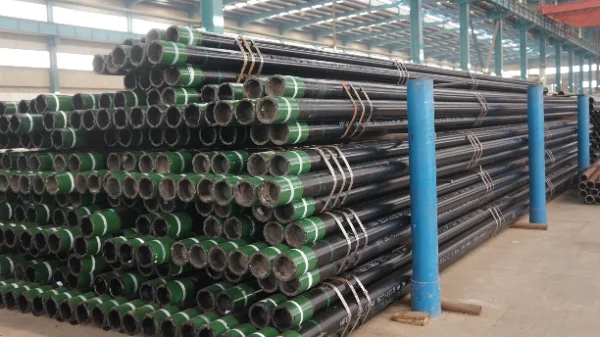Exploring the importance of oil country tubular goods
Are you interested to know about oil country tubular goods?
· In the exploration, drilling, and production of oil and gas, specialized steel pipes and tubes are referred to as oil country tubular goods (OCTG). The severe circumstances of oil and gas wells, which frequently entail high pressures, corrosive environments, and fluctuating temperatures, are what OCTG products are made to resist.
· To assure their dependability in the severe circumstances of oil and gas wells, they are normally made using premium steel and put through rigorous quality control procedures. The steel used in OCTG products is frequently heated and put through additional procedures to improve its mechanical characteristics, such as strength, toughness, and corrosion resistance.
· Given the vital role oil country tubular goods play in oil and gas operations, the industry prioritizes their quality and performance. To guarantee the security and effectiveness of oil and gas well operations, they must adhere to a number of industry standards and regulations.
OCTG includes a range of products, such as:
· Casing:
The walls of a drilled wellbore are lined with casing pipes. They aid in keeping the surrounding formations from collapsing and sustain the well structurally. In addition to providing a channel for oil or gas production from the reservoir to the surface, casing separates various formations to stop fluid mixing.
· Tubing:
Tubing is put inside the casing and used as a conduit to transport gas and oil from the reservoir to the surface. It is generally built to survive the severe conditions of the well environment and has a smaller diameter than the casing.
· Drill Pipes:
During the drilling operation, drill pipes are used to revolve the drill bit. They bring cuttings back to the surface while also transferring drilling fluid (mud) to the bit. Drill pipes must be able to bear significant torque and stress when drilling.
· Drill Collars:
Drill collars are large steel tubes with thick walls weighing down the drill bit. This weight aids the bit's ability to pierce the rock formations more efficiently. In the drill string, drill collars are placed directly above the drill bit.

What are the advantages of oil country tubular goods?
Oil Country Tubular Goods provides a plethora of benefits that are essential for the efficient discovery, exploitation, and production of oil and gas resources. These benefits cover longevity, resistance to corrosion, well integrity, and general operational effectiveness. Here is a detailed look at some of the main advantages of OCTG:
· Durability:
High-quality steel is used in the manufacturing of OCTG products since it is intended to endure the harsh conditions present in oil and gas wells. High pressures, temperature swings, abrasive drilling settings, and probable contact with corrosive fluids are some of these circumstances. Wells' long-term integrity is ensured by the longevity of OCTG, which reduces the need for regular replacements and repairs.
· Corrosion Resistance:
Corrosion-resistant materials, such as specialized coatings and alloys, are frequently applied to the steel used in OCTG. This is important because the gases and liquids found in oil and gas reserves have the potential to be quite corrosive. The durability of wells is increased, and the possibility of leaks or failures brought on by material deterioration is decreased thanks to the corrosion resistance of OCTG materials.
· Well Integrity:
OCTG is essential to keeping oil and gas wells in good condition. Tubing serves as a conduit for the production of hydrocarbons, while casing pipes are utilized to prevent wellbore collapse and isolate various formations. Wells can endure the mechanical and environmental loads they undergo throughout their operating lifespan because of the structural strength and integrity of OCTG materials.
· Reliable Performance:
Consistent and Reliable Performance: OCTG's production process includes strict quality control methods that guarantee this. The chance of unanticipated operational failures or interruptions is decreased since well operators may rely on these goods to perform as planned.
OCTG products are made to work with a variety of downhole tools, manufacturing processes, and well-completion procedures. This compatibility gives designers more freedom to create well designs that are tailored to certain reservoir features and production objectives.
· Enhanced Production:
Optimum manufacturing and efficient fluid flow are factors that are taken into consideration while designing OCTG products, particularly tubing. The smooth movement of gas or oil from the reservoir to the surface can be facilitated by well-designed tubing, increasing production rates.
· Sealing and containment:
Maintaining the integrity of the wellbore is essential for avoiding fluid movement across various formations and zones. Casing and tubing that have been placed correctly offer reliable seals that guard against cross-contamination and guarantee the regulated extraction of oil and gas resources.
· Protection of the environment:
Well failures and leaks can result in environmental risks such as contaminated land and groundwater. The durability of OCTG products reduces the possibility of leakage, assisting in environmental preservation and ensuring ethical resource exploitation.
· Cost-effectiveness:
OCTG goods may have higher initial prices because of their high quality and specialized manufacture, but over time, they end up being less expensive because of their longer lifespans and less need for replacements. Additionally, the OCTG's dependability reduces expensive downtime brought on by equipment malfunctions.

Conclusion:
Oil country tubular goods are essential to the energy sector because they make oil and gas production and transportation easier. These specialized pipelines provide an effective flow of hydrocarbons from the reservoir to the surface while being able to endure harsh environmental conditions. Drilling operations significantly rely on OCTG in the oil and gas sector. About 30 years have passed since CANGZHOU SHENLONG PIPEMANYFACTURING Co., Ltd. began manufacturing and exporting steel pipes. We have provided clients with successful support for hundreds of different projects and stringent quality control systems, from the receipt of raw materials in manufacturing to the delivery of the final items.






